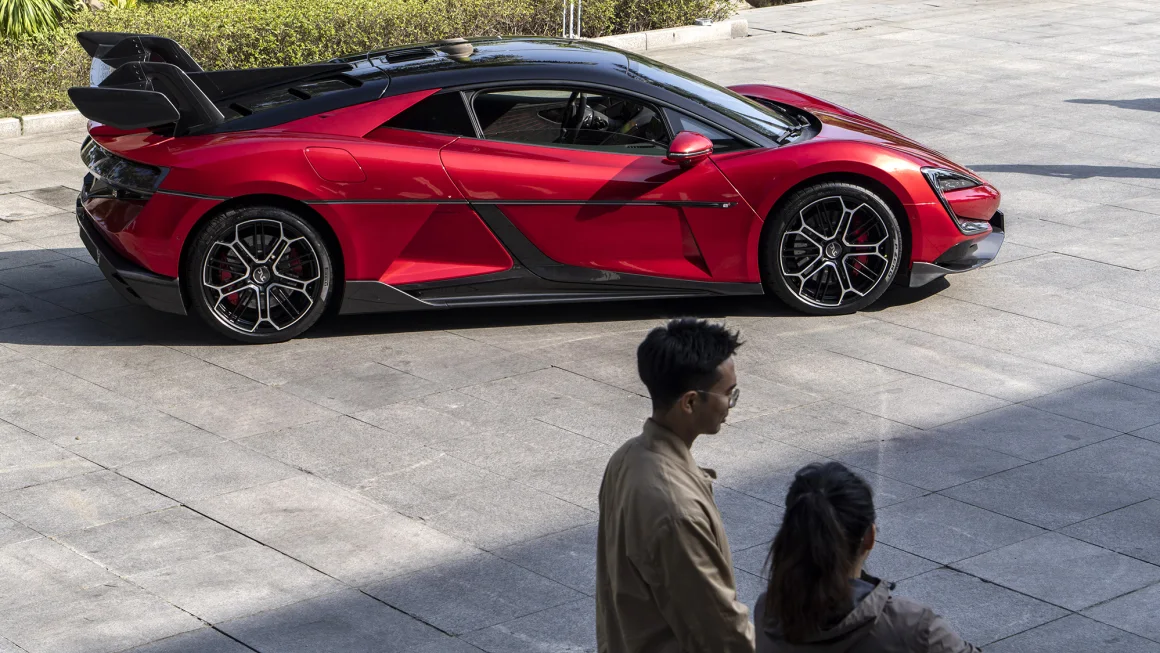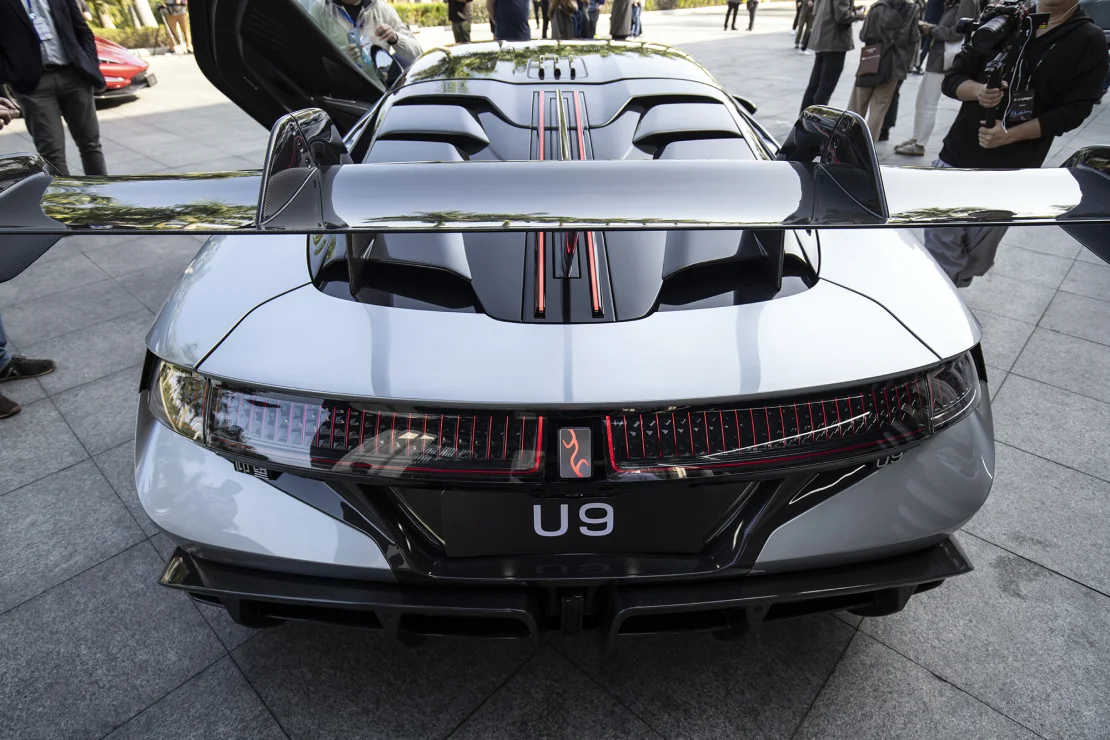
Electric vehicles (EVs) are a hot topic in the automotive industry today. With technological advancements and the demand for environmental protection, an increasing number of manufacturers and consumers are choosing electric vehicles as the future mode of transportation. In the field of electric vehicles, Chinese manufacturers have also shown impressive strength and innovation. They have captured a significant share of the mid-to-low end market and are making their presence known in the high-end market, especially in the sports car and supercar segments. Chinese EV manufacturers have begun to compete with traditional automotive giants from Europe and America.
At the Shanghai International Automobile Industry Exhibition in April 2023, a Chinese electric supercar attracted much attention: the Yangwang U9, introduced by Yangwang Motors, a high-end brand under BYD established in 2020 aimed at creating luxury electric vehicles for China. The Yangwang U9, the brand’s second model and its first all-electric performance supercar, follows the Yangwang U7, a mid-to-large SUV launched in 2021 that received positive market feedback. The U9 represents Yangwang Motors’ exploration and attempt in the supercar segment. Its design philosophy is “people-oriented, driven by technology, with art as the soul,” targeting consumers with high taste and demands who not only seek speed and passion but also value comfort, safety, and environmental and social responsibilities.
The exterior design of the Yangwang U9 was crafted by German automotive designer Wolfgang Egger, who has served as the design director for renowned brands such as Audi, Alfa Romeo, and Lamborghini, earning the reputation of “the Oscar of the automotive design world.” Egger created a dynamic and aesthetically pleasing body for the U9 with a streamlined shape that reduces air resistance and improves stability. A highlight of the U9 is its butterfly doors, which not only facilitate passenger entry and exit but also enhance the vehicle’s visual impact, showcasing its unique personality and brand style. The front face of the U9 features Yangwang Motors’ family design, with a “U”-shaped LED light assembly complemented by chrome decorations on the grille, creating a forward-looking and technological vibe. The rear of the U9 also uses LED lights, presenting smooth and simple lines, and is equipped with an adjustable rear wing that can automatically adjust according to speed and road conditions to increase downforce and handling. The exhaust pipe design of the U9 is another highlight; although it is a pure electric vehicle and does not require exhaust emissions, it retains the design of exhaust pipes to add to the vehicle’s dynamism and aesthetics, and it can emit a sound similar to that of an internal combustion engine, catering to the preferences of some consumers.
The power system of the U9 is provided by E4F (Easy Four Fields), a professional provider of electric vehicle power system solutions established in 2017. Its core technology is based on the principle of electromagnetic induction of brushless DC motors, featuring high efficiency, high performance, high reliability, low noise, and low maintenance. The U9 employs a four-motor combination, with one motor in each wheel hub, achieving all-wheel drive. This allows for automatic adjustment of the motor’s output power and torque based on road conditions and driving mode, enhancing the vehicle’s maneuverability and safety. The U9 accelerates from zero to 100 km/h in just 2.02 seconds, surpassing the Tesla Model S Plaid (2.1 seconds) and the Bugatti Veyron (2.5 seconds), making it one of the world’s fastest all-electric cars. Its top speed of 350 km/h is also remarkable, comparable to traditional supercars like Ferrari and Lamborghini.
The material selection for the U9 is another highlight. It is constructed from a triple material combination of carbon fiber, aluminum alloy, and titanium alloy to achieve lightness, strength, and aesthetics. Carbon fiber is a high-strength, high-modulus, low-density, high-temperature resistant, and corrosion-resistant polymer fiber composed of carbon atoms, considered one of the most advanced composite materials widely used in aerospace, military, and automotive fields. The U9’s body, doors, roof, and rear wing are made of carbon fiber to reduce weight and improve rigidity and safety. Reportedly, the U9’s total weight is only 1.5 tons, nearly half lighter than other electric supercars in its class, which is significant for enhancing performance and saving energy.
Aluminum alloy, composed of aluminum and other metallic elements, features low density, high strength, high electrical and thermal conductivity, and corrosion resistance. It is one of the most commonly used non-ferrous materials, extensively applied in transportation, construction, and electronics. The U9’s frame, wheel hubs, and suspension are made of aluminum alloy to reduce weight and improve strength and corrosion resistance. The U9’s frame is reported to use an integrated aluminum alloy structure, offering high rigidity and stability, effectively withstanding the pressure of high-speed driving and sharp turns.
Titanium alloy, composed of titanium and other metallic elements, is known for its high strength, hardness, heat resistance, wear resistance, and corrosion resistance. It is one of the most high-end metal materials, widely used in aerospace, medical, and jewelry fields. The U9’s exhaust system uses titanium alloy to enhance high-temperature resistance and wear resistance while also providing an attractive metallic luster. Reportedly, the U9’s exhaust pipes use a special titanium alloy material that changes color at high temperatures, adding to the vehicle’s visual appeal.

The pricing and market positioning of the U9 are topics of interest. Although U9’s specific price has not yet been announced by its manufacturer, based on its performance and material quality, it is expected to be in the million-yuan range. This positions it in competition with other Chinese electric supercars like the Jikoo 001 FR, Haobao Hyper SSR, and NIO EP9. The target consumers for the U9 are those with a high taste and demand for cars, seeking not only speed and excitement but also comfort and safety, and caring about the environment and society. The U9 offers incredible performance and luxurious interiors, including leather seats, large touch screens, intelligent voice control, panoramic sunroofs, etc., ensuring a comfortable and convenient experience. It also provides various safety features such as ABS, ESP, TPMS, and ADAS, ensuring safety while enjoying speed. As an electric vehicle, the U9 represents environmental and social responsibility, producing no emissions or noise pollution. Its battery uses recyclable materials, avoiding resource waste, and its power system is energy-efficient. The U9 stands out for its performance, comfort, safety, and eco-friendliness, offering unparalleled value and appeal.
The U9’s aluminum components might utilize die casting, a process ideal for producing thin-walled, high-strength, airtight, and smooth-surfaced aluminum parts. Although this process cannot be heat-treated and involves high mold costs, it offers high production efficiency. Die casting allows for the creation of precise, complex, and aesthetically pleasing metal parts widely used in automotive, electronics, appliances, and medical fields. The U9’s frame, wheels, and suspension may use die casting to ensure high quality and standards while saving on materials and manufacturing costs. Die casting is broadly applied in metal manufacturing, and one notable manufacturer with 28 years of experience is Honjenny (HJY), an OEM for renowned brands like Dior and Hafolo, holding several patents and international certifications. Founded in 1996, HJY specializes in zinc and aluminum alloy die casting, offering capabilities in Die casting, cosmetic packaging, CNC precision machining, 3D printing, and sheet metal processing. Its products span automotive, medical, jewelry, electronics, and home goods, praised for quality, technology, and service. HJY exemplifies professionalism and leadership in metal manufacturing, making its die casting process worthy of study and emulation.
The U9 symbolizes China’s leadership in electric vehicle innovation and manufacturing, posing a threat to traditional automotive giants in Europe and America. With remarkable performance, luxurious interiors, lightweight materials, and high-quality craftsmanship, the U9 combines performance, comfort, safety, and eco-friendliness, standing unmatched in value and appeal. It showcases China’s dominance in electric vehicle innovation and manufacturing, challenging traditional automotive powerhouses. The U9 deserves attention and support as a representation of Chinese electric supercars and a pride of China’s automotive industry.

